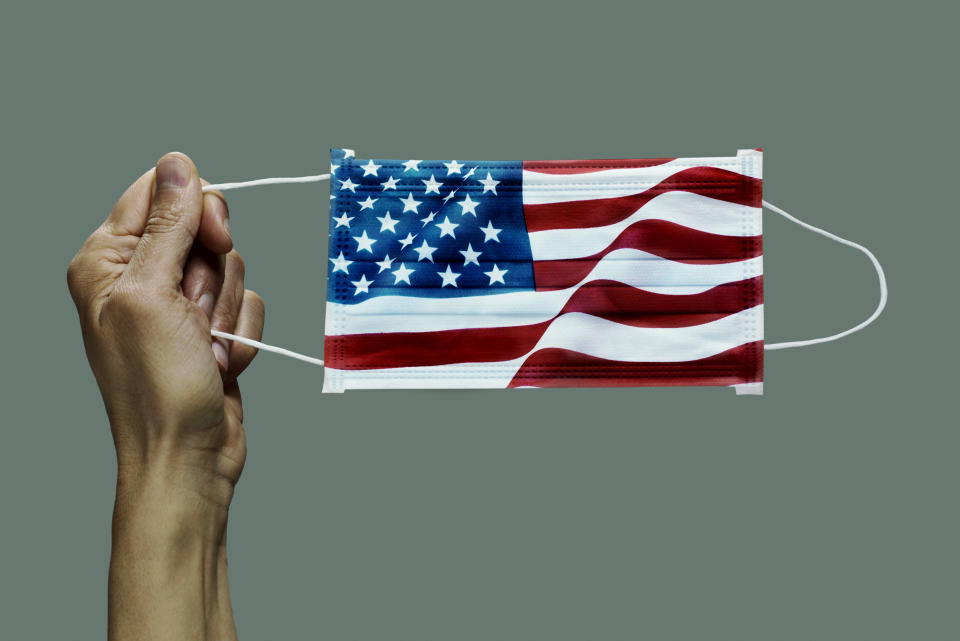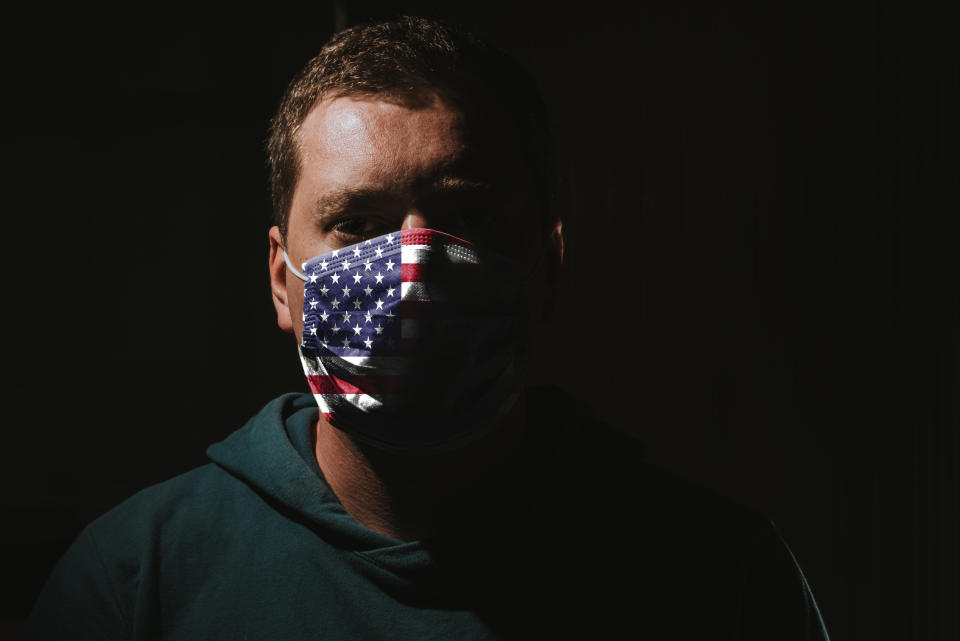'My brother won't wear a mask': How to handle family conflicts about the coronavirus over 4th of July weekend
As America heads into the Fourth of July holiday weekend — perhaps the first, for many, without fireworks, beach days or crowded cookouts, due to the coronavirus pandemic — it’s bound to feel a bit more fraught than usual. Add to the mix visits with extended family members or dear friends who may have conflicting opinions when it comes to mask-wearing or social distancing, and the tension rises even higher.
That’s something Julie (not her real name) says she began dealing with ahead of the holiday weekend, when she and her husband, who has underlying medical issues, were set to head to an East Coast beach town to meet up with other family members. The plan was for everyone to stay in separate places but gather outdoors from time to time. Last week, she says, she sent an email to everyone, asking about people’s comfort levels. All agreed to bow to the most cautious person in the group — except for her brother.
“He wrote to say that he would not be wearing a mask, which was an infringement of personal liberty, and that social distancing was outmoded,” she tells Yahoo Life. “It was very stressful, because I’ve been working extremely hard … and then I had to also spend a lot of time also thinking about how to handle it and what I would say, and strategizing with other family members. It made me feel frustrated and resentful.” It remains to be seen now whether the brother will join his family at the beach or stay home altogether.
Similarly, Sherry (also not her real name), says she recently drove several hours to Long Island to visit her 81-year-old mother, who lives alone. That came after three months of scant socializing and strict mask wearing, but says she accepted that, with the visit, her mom “was very quickly in my pod.” During her stay, though, siblings and other family members who live nearby frequently pressured her to attend gatherings, hug them and come inside their homes.

“There was a particularly awkward moment,” she says, at a Father’s Day picnic, “when all the food was put on a small round table, and everyone’s hands went into the shrimp bowl. I just said, ‘no thank you.’ … Then everyone was cheek-to-jowl sitting and eating, so I took my chair and moved it back a few feet and balanced my plate on my lap.” Her sister-in-law, a nurse, called loudly for her to come closer, prompting her brother to “kind of roll his eyes a bit and say, teasingly, ‘she’s social distancing.’” The entire visit home was “uncomfortable and awkward and challenging, to say the least ...” she says. “And it’s hard, because there are conflicting protocols. I really hope I didn’t bring anything home with me, because I was exposed to a lot more than I had been before.”
Neither woman is alone right now in facing such challenges, according to experts.
“Many are struggling with people in their lives about maintaining boundaries, like wearing masks, social distancing and the like,” Dr. Jen Hartstein, psychologist and Yahoo Life Mental Health Contributor, tells Yahoo Life. “It is creating conflict and challenges related to opening up quarantine circles, especially as areas of the country are increasing in their numbers.”
Adds Len Felder, a psychotherapist and author of We See It So Differently, about dealing with family friction, and When Difficult Relatives Happen to Good People, “In at least 40 percent of couples I counsel and in more than 50 percent of families this summer, there is one person who truly needs extra precautions because he or she is medically vulnerable right now. Yet there is often one person who ‘doesn't like rules’ or ‘doesn't like to be told what to do,’ or who does care but is sometimes distracted … So, a lot of tension and friction occurs.”
Felder explains that, while any tension with family members can be stressful, flare-ups surrounding health during the pandemic can feel like a whole new level of upset.
“These differing approaches for how to deal with COVID-19 are extra emotionally upsetting, because most of us feel, ‘I want to be able to trust the people closest to me — and I'm not sure I can trust this person right now.’ It's very painful when you can't fully trust or feel comfortable with someone you love or who is so important to you,” he says.
Meanwhile, Felder adds, on the flip side, “the person who sometimes wants to break out and get back to life-as-before is feeling, ‘I am [dealing] with an extremely rigid, inflexible and anxious person … this is exhausting.’ No one wants to have someone second-guessing their every move throughout the day.” Prior to the pandemic, says, “most couples and most families tended to give each other a lot of breathing room and permission to do things in their own way,’ yet now there is such an intense sense of being extremely interdependent … so it's a whole new challenge we've never had to face before.”

Hartstein adds that such conflicts can feel more intense because the anxiety is already heightened. “The anxiety is fueled by the unknown, which we are all experiencing, and the unknown triggers a lot of negative thinking and increased worry for most of us,” she says. “For many, that anxiety is amplifying the worry that already exists about getting sick. For those of us with older parents, we worry that they won’t be careful, will get sick and we won’t be able to be with them, especially when their risk of death is higher. It’s challenging when people’s level of anxiety is different and we cannot get people in our lives to understand.”
She suggests, “If we could have a conversation from a place of emotion rather than force, it might help people understand what the real concern is.”
Here are some other coping strategies when it comes to getting together with family or friends who may not be on the same page as you:
Ask about boundaries ahead of time
“Before you go to someone’s home, ask what they are comfortable with. Check in with them about their expectations in their home,” Hartstein suggests. And then, if the answer goes against your beliefs and limits, “you may decide not to go.” That may wind up being the case with Julie’s brother — something that Felder says would be “perfectly appropriate right now.” He adds, “The family can still respect and be kind to one another, even if one family member feels the need to be apart because he or she is medically vulnerable and doesn't want to be around anyone, or if a person is adamantly opposed to face masks and doesn't want to be around those who insist on face masks and social distancing. Each family member can be listened to for their different points of view, as long as the safety of the most vulnerable individuals is given top priority.”
Have a respectful conversation and strategize together
“We don’t have to agree and we have to be respectful,” says Hartstein. “Talk about your feelings, why you think things are important and what your expectations are. And don’t wait until the last minute.”
Felder suggests dedicating “a quiet, non-rushed 10 or 20 minutes to just listen to each other's sense of overwhelm or frustration — without jumping to solutions or disagreeing.” Instead, he says, “just listen, notice if your heart is open or if you're rehearsing a comeback line in your head.” If you truly listen to one another without judgment or contradiction for that length of time, he says, it will be easier to brainstorm about possible solutions that everyone can live with. “The goal,” he says, “is to be brainstorming allies rather than snarky adversaries.”
Further, Felder suggests the following group exercise: Draw three circles on a piece of paper. In the first, write what you think would be “way too risky,” and in the second, “way too cautious.” Then, in the third, see if there are some places in between the two extremes that both or all of you can live with. “Sometimes by seeing that you both agree and are aligned on what is way too risky or what is way too cautious, you can then feel less antagonistic when you start to explore the various solutions in between that are possible if you work together.” But key to the final decision, he says, is recognizing “that the person who is most at-risk medically or least likely to be able to survive the virus is the person who gets to have the final say on whatever hybrid solutions you come up with.”
Know it’s OK to say “no”
“Don’t be afraid to ask for what you want and need and say no. You are entitled to your opinion and to stand up for your needs,” Hartstein stresses. That also means being understanding if you are being told no, Felder says. “This is not the time to insist, ‘You must show up and put on a happy face or we're going to guilt trip you forever.’ Rather,” he says, “this is a rare time when we all have to protect our vulnerable loved ones — but also a good time to listen with respect to those who are highly ‘allergic’ to rules or pressures to conform.”
Practice “radical acceptance”
“You may not get what you want and you have to accept that,” says Hartstein. “It’s frustrating and disappointing and can be scary and, in the interest of your relationships, you may have to work toward accepting that everyone has different limits and boundaries.” While “you get to decide what you want to be around and don’t have to apologize for that,” she adds, “you do have to accept that other people are also entitled to their boundaries and accept that. It doesn’t mean you like it, [but] if you can accept it, you will have less conflict overall.”
For the latest coronavirus news and updates, follow along at https://news.yahoo.com/coronavirus. According to experts, people over 60 and those who are immunocompromised continue to be the most at risk. If you have questions, please reference the CDC’s and WHO’s resource guides.
How to maintain your physical and mental health during the pandemic
Taking care of a loved one with COVID-19? Here’s how to stay healthy
Q&A with Dr. Kavita Patel: How to keep your family safe and maintain your mental health
Read more from Yahoo Life
Sleep deprivation from nightly fireworks 'can be viewed as torture,' doctor says
What's the difference between a 2nd wave and 2nd peak of COVID-19?
From cookouts to fireworks, here’s how to celebrate the 4th of July safely during the pandemic
Want daily lifestyle and wellness news delivered to your inbox? Sign up here for Yahoo Life’s newsletter




